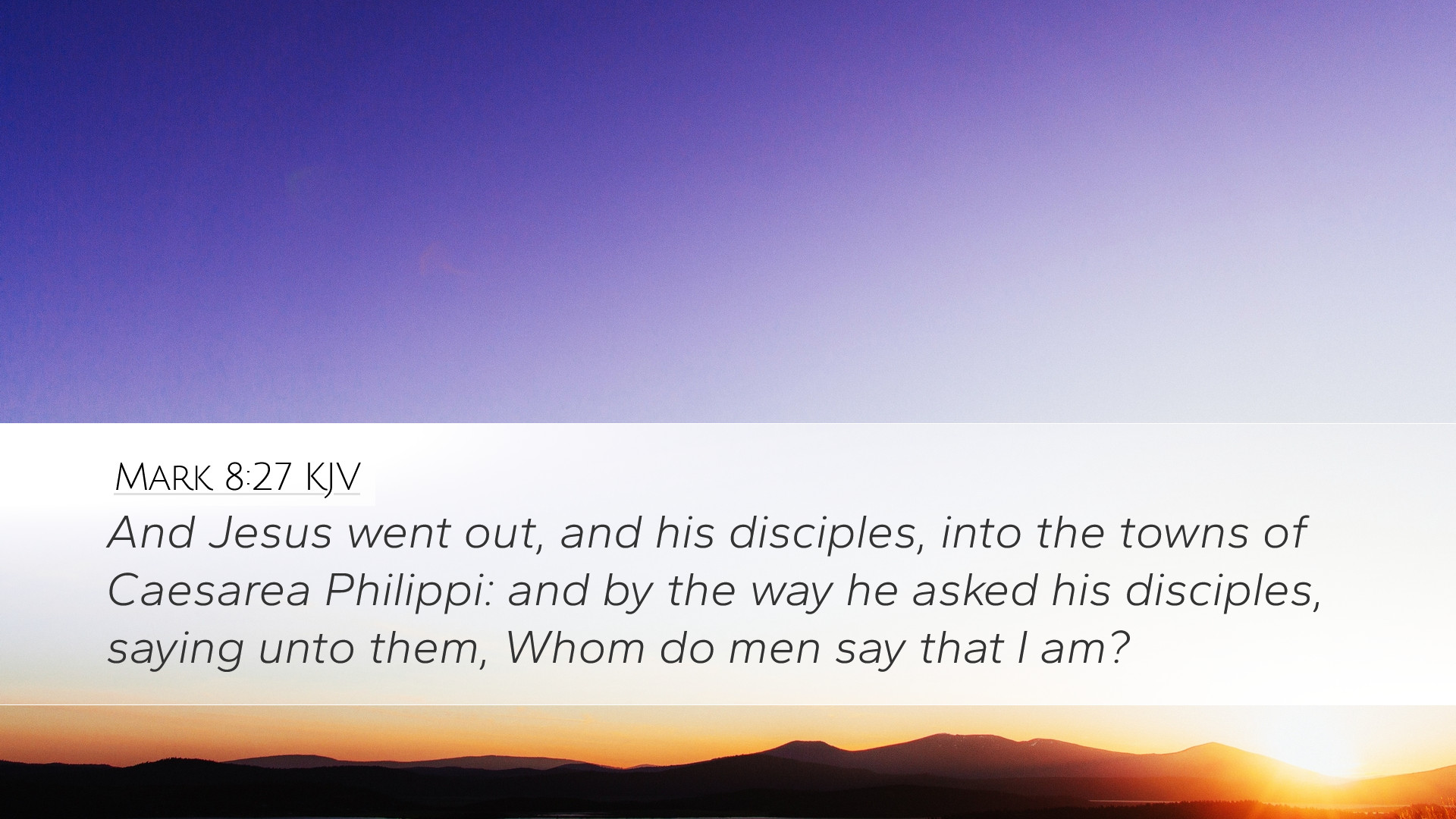Commentary on Mark 8:27
Verse Text: "And Jesus went out, and his disciples, into the towns of Caesarea Philippi: and by the way he asked his disciples, saying unto them, Whom do men say that I am?" (Mark 8:27 KJV)
Introduction
This pivotal verse marks the transition in the Gospel of Mark from the demonstration of Christ’s authority to the revelation of His identity. As we explore the insights provided by various public domain commentaries, we will delve into the contextual significance, theological implications, and the personal application of this question posed by Jesus to His disciples.
Contextual Overview
Geographical Setting: The reference to "Caesarea Philippi" is significant. It is a city located at the northern boundary of Israel, known for its pagan worship. Matthew Henry highlights that this context symbolizes a stark contrast between the world's views and the truth revealed by Christ. The setting itself becomes a backdrop against which Jesus probes His disciples' understanding of His identity.
Discipleship and Questioning: Jesus' inquiry is not merely for information but serves as a teaching moment for His disciples. Albert Barnes remarks that this question also invites personal reflection about their understanding and belief. Jesus is aware of the rumors circulating in the populace and uses this moment to cement His disciples' comprehension of His nature.
Insights from Commentators
- Matthew Henry: He emphasizes the importance of Jesus directing the question to the disciples, illustrating a personal engagement in their faith journey. Henry observes how people’s opinions about Christ varied widely, reflecting the confusion that surrounded His ministry.
- Albert Barnes: Barnes points out that Jesus' inquiry serves as a precursor to revealing His true nature as the Messiah. He notes that understanding public sentiment is crucial for the disciples, as it prepares them for the deeper truth of Christ’s mission.
- Adam Clarke: Clarke comments on how the question reflects the various views of Jesus' identity held by different groups. He elaborates on the responses the disciples might have heard, such as Jesus being likened to John the Baptist, Elijah, or one of the prophets, illustrating the varied but mistaken views regarding the Messiah's identity.
Theological Implications
Christological Significance: The question "Whom do men say that I am?" invites a deep exploration of Christ's dual nature as both divine and human. It challenges readers to ponder their understanding of Jesus, not merely as a historical figure but as the living Son of God. Matthew Henry notes that the ongoing discussion about Jesus’ identity emphasizes that it is not enough just to have opinions; actual recognition of His lordship is necessary for salvation.
Confusion and Misunderstanding: The differing opinions of the populace reflect common misconceptions that exist even today. Albert Barnes stresses that the world's misunderstanding of Jesus remains prevalent; people often perceive Him through the lens of their own experiences or cultural contexts, diluting the purity of His identity.
Personal Revelation: As the setting leads to personal introspection, Jesus' question also serves as a call to discipleship. Adam Clarke suggests that understanding who Christ is should naturally lead to a personal revelation and commitment. This verse invites the reader to reflect on their relationship with Christ and their understanding of His nature.
Application for the Believer
Reflective Inquiry: Believers are invited to engage with this question personally. The gospel encourages self-examination regarding one's own answer to who Jesus is. Henry suggests that a genuine answer leads to a deeper faith and a more profound commitment to Christ's mission.
Importance of Community: This verse underscores the importance of community in understanding Jesus' identity. The disciples are engaged in a communal experience; thus, pastors and church leaders should encourage discussions around Christ's identity within their communities. Barnes points out that communal dialogue can illuminate misunderstandings and strengthen faith.
Shared Witness: Lastly, the recognition of Jesus as the Messiah should propel believers into action. Clarke mentions that once the disciples identify Jesus as the Christ, they are tasked with the responsibility of sharing this truth. This mandates a proactive approach to evangelism and a commitment to living out the teachings of Christ in daily life.
Conclusion
Mark 8:27 serves as a critical juncture in understanding the identity of Jesus Christ. By reflecting on the insights provided by esteemed commentators, we recognize the importance of personal and communal understanding of Christ's nature. Ultimately, this verse calls for a response from each believer, inviting both a personal contemplation and a communal affirmation that Jesus is indeed the Christ, the Son of the living God.


